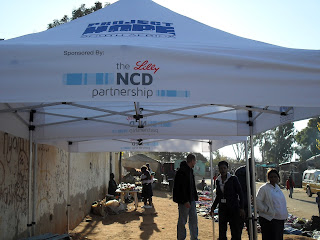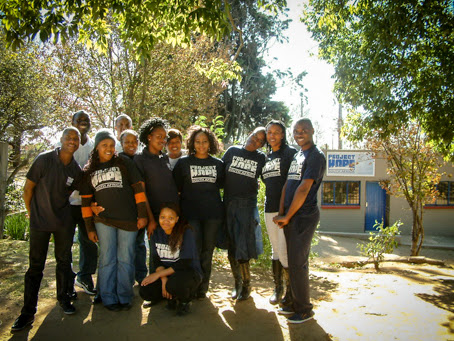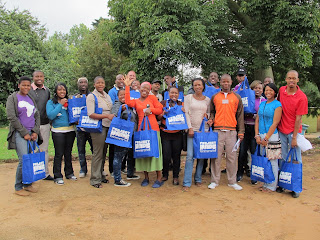 |
| Setting up our testing station |
Project HOPE South Africa as part of the HOPE Centre project, funded through the Lilly NCD partnership held its first diabetes and hypertension screening event in Zandspruit on Saturday 16th June 2012. Despite a freezing cold day and recent service protests in the community which shut down everything, we managed to screen over 150 people and generated a lot of interest in our project in Zandspruit.
 |
| Nurses registering patients |
Screening events like this one are part of our strategy to sensitize and make communities aware of the growing problem of (pre)diabetes, (pre)hypertension in these urbanising areas. In sub-Saharan Africa only 15% of people with diabetes have been diagnosed, meaning the vast majority of people are living with the disease and only presenting at the clinics when complications have set in. By offering free screening opportunities like this one, we are able to catch the diseases sooner, get people onto treatment when necessary quicker and improve patients quality of life.
 |
| Our team of volunteer nurses |
We were supported by a wonderful team of 13 volunteer nurses provided to us by Empilweni Nursing College in Randburg who helped us weigh and measure patients so we could take their BMI, prick fingers to get a random blood glucose value, take blood pressure and then provide counselling and referral services at the end. Teams of nurses from the college will be a regular part of these screening days ensuring that we can screen as many people as possible at one go
 |
| Patients queuing for the various tests |
Homemed, a medical diagnostics company donated all our glucometers, strips and lancets and provided training to the nurses on how to use the glucometers.
 |
| Getting a finger pricked! |
All the patients that we saw, received education material about the risks of diabetes and hypertension, were educated about their results, and where necessary were referred either to the government clinic for an immediate follow up, or to Project HOPE's clinic for a re-test in 3-6 months time. This is a really important piece of the puzzle. Many times patients receive tests, but because nursing staff are over stretched they do not have the time to sit down with the patient and explain thoroughly what the numbers mean. Project HOPE is using a very simple, yet effective stop light system approach so the patients were able to see if they were in the 'Red' or danger zone, 'Yellow' or warning zone, and 'Green' or healthy zone.
Project HOPE will be screening in Cosmo City this Saturday the 23rd June, and then again in Zandspruit in August. Over the next couple of years we will be repeating this on an regular basis.
Check back next week for pictures of our screening event in Cosmo City!

































